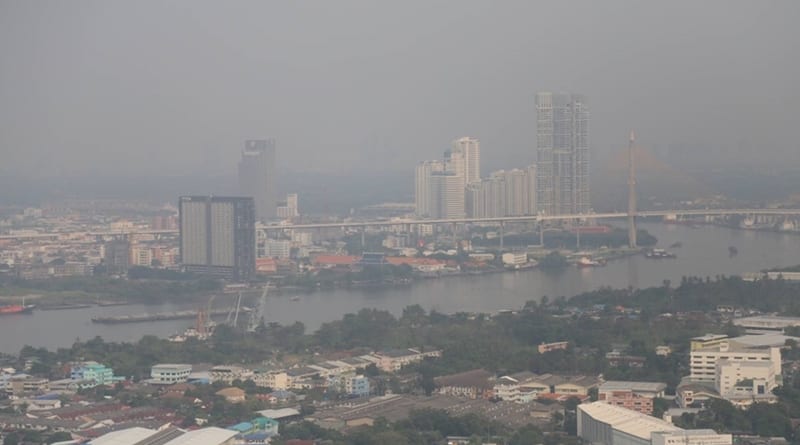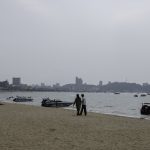The ongoing push in Parliament to improve Thailand’s appalling record of air pollution offers hope that the decades-long threat to public health posed by PM2.5 smog could soon be curbed.
The severity of the threat is so grave that the House of Representatives voted overwhelmingly for seven “clean air” laws on January 17. The seven bills, proposed by different parties, sailed through their first reading with 443 votes in support, none against, and one abstention.
The legislation is expected to become law in the next few months, said Dr Buntoon Srethasirote, who chairs the working group tasked with drafting the clean-air bill for the government’s Strategic Transformation Office (STO).
“I expect the new law to take effect in April and contribute to our successful control of PM2.5,” he said.
PM 2.5 threat in Thailand
PM2.5 denotes the finest grade of dust particles – 2.5 microns or less in diameter – that can lodge deep in the lungs. Breathing in high levels of these particles has been linked to a heightened risk of premature death from lung cancer, heart disease and stroke. It also leads to increased hospital admissions for heart and lung problems, acute and chronic bronchitis, asthma attacks, respiratory symptoms, and more.
The main sources of PM2.5 pollution are agricultural and forest burning in Thailand and neighbouring countries, as well as urban traffic, construction and industry.
The specter of seasonal smog has haunted Thailand for nearly two decades already, with the North bearing the brunt of the crisis. The problem has become so critical that it was placed on the national agenda in October 2019.
According to the Big Data Institute, levels of PM.2.5 dropped in Thailand during the COVID-19 pandemic as restrictions curbed social and economic activities.
“Since the COVID-19 situation eased, people have resumed normal activities and we can see that PM2.5 levels have been rising, especially in the North and Bangkok,” said Dr Peeradon Samasiri, manager of the institute’s Envi Link project.
He also emphasized findings that show the smog season is getting longer each year. Bangkok’s smog levels used to peak in January or February before gradually easing.
That has changed in recent years.
“We found that the smog period in Bangkok two years ago lasted until April,” Peeradon said.
A similar trend was detected in Chiang Mai, where the smog crisis used to last until March but now drags on until April. Studies show that living through the smog season in Chiang Mai without a face mask is comparable to smoking between 2 and 4.5 cigarettes per day.
The situation is even worse in Chiang Mai’s northern neighbors of Nan and Mae Hong Son, where breathing the air during periods of heavy smog is equivalent to smoking between 5.5 and 7.5 cigarettes a day.
Peeradon wants authorities to take note of these alarming statistics and design – as well as enforce – practical measures to curb the threat from PM2.5.
New measures
The STO’s Buntoon said the bill proposed by his agency seeks to tackle the root causes of PM2.5 emissions through collaborative efforts among stakeholders, especially government agencies. If it becomes a law, provincial governors will be given the authority to identify air-pollution zones and target them with strong measures to curb the threat. Tax measures will also be deployed in support of cleaner air.
“We have learned from past failures. Banning agricultural fires during certain times of the year does not help much. Farmers just rush to light fires before the ban period begins or simply wait till it ends,” he said.
The STO is now leading efforts to replace the blanket ban with a registration system for farmers known as FireD. The system will process crop-burning requests from farmers, utilizing weather forecasts and wind directions to determine suitable days for the activity.
“We will also increase our engagement with the private sector, academia and communities to drive fruitful efforts,” Buntoon said.
The STO has identified poverty as another factor fueling the smog crisis, pointing out that for small farmers burning may be the only economically viable way of clearing their fields.
Other clean-air bills
Six other draft bills aimed at improving Thailand’s air quality are also being deliberated by Parliament. Five have been proposed by political parties, namely the government coalition’s Pheu Thai, Bhumjaithai, and Palang Pracharath, and the opposition’s Move Forward and Democrat parties. The sixth has been proposed by a civil society organization (CSO) backed by a petition from 22,251 voters.
Each of these bills has its own raft of solutions to combat the smog crisis. For example, the CSO’s bill pushes for the establishment of a Clean Air for Health Organization and a Clean Air Fund to help vulnerable and low-income people in smog-hit areas. It also prescribes hefty penalties for polluters, even in neighboring countries. These include fines of up to 2 million baht for anyone causing smog to drift over the border into Thailand and affect the environment and people, plus 1 million baht per day for as long as the smog problem lasts.
The STO’s draft bill features economic incentives to discourage smog-causing activities and the appointment of officials to monitor the problem. Violators would face hefty fines and possibly even jail terms.
Pheu Thai’s bill, meanwhile, focuses on developing a digital map of air-pollution sources for efficient monitoring and control. It also prescribes the establishment of several committees, including at the provincial level, to drive clean-air causes.
Old wine in new bottles?
Sonthi Kotchawat, an independent expert on the environment, has criticized the bills’ content, saying they mostly repeat existing laws on air pollution. He says the solution lies not in passing new laws but in ensuring proper enforcement of the laws already enacted.
He also pointed out that there is already a fund to combat pollution, financed by oil taxes.
Sonthi is worried, too, that the new laws would establish redundant committees that would end up slowing down the workflow.
Political parties were merely exploiting the hot-button issue of PM2.5 to win public support and votes, he added.
Sonthi said the exception was Move Forward’s bill, citing its focus on “toxic dust particles”.
“We can’t focus just on PM2.5. [Preventing emissions of] bigger particles like PM10, sulfur dioxide, carbon monoxide, and volatile organic chemicals must also be addressed,” he said.
By Thai PBS World’s General Desk
CHECKOUT OUR NEW ONLINE MAGAZINE https://online.flippingbook.com/view/981190657/





